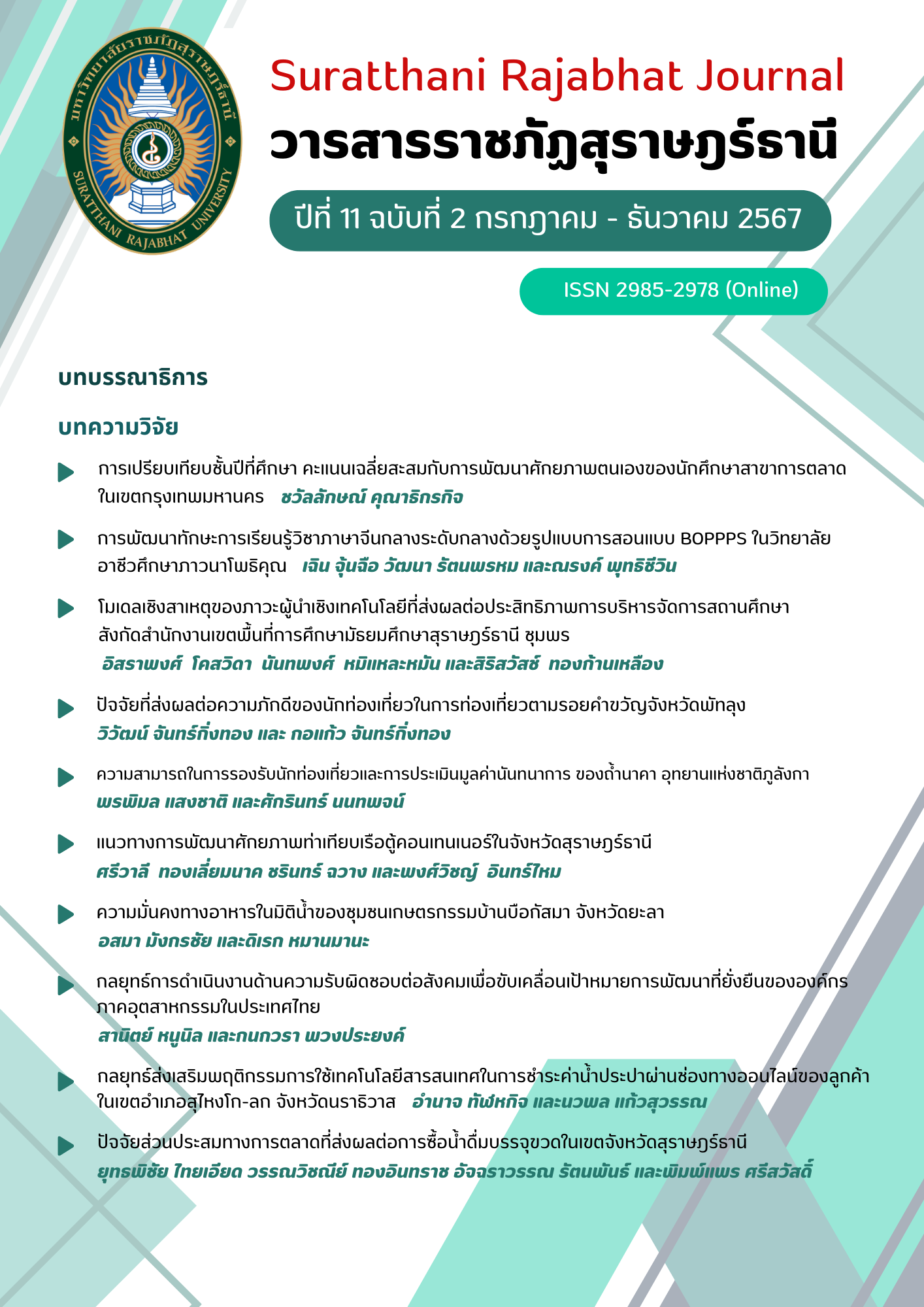กลยุทธ์การดำเนินงานด้านความรับผิดชอบต่อสังคมเพื่อขับเคลื่อนเป้าหมายการพัฒนาที่ยั่งยืนขององค์กรภาคอุตสาหกรรมในประเทศไทย
Main Article Content
บทคัดย่อ
บทความวิจัยนี้มีวัตถุประสงค์เพื่อวิเคราะห์กลยุทธ์ที่สำคัญในการดำเนินการด้านความรับผิดชอบต่อสังคมขององค์กรและเพื่อศึกษาการขับเคลื่อนเป้าหมายการพัฒนาที่ยั่งยืนผ่านการดำเนินงานด้านความรับผิดชอบต่อสังคมขององค์กรเป็นการศึกษาเชิงคุณภาพ เก็บรวมรวมข้อมูลโดยการสัมภาษณ์กลุ่มและการสัมภาษณ์เชิงลึก จากผู้บริหารด้านความรับผิดชอบต่อสังคมขององค์กรภาคอุตสาหกรรมที่ได้รับรางวัลอุตสาหกรรมดีเด่น ประเภทความรับผิดชอบต่อสังคม ระหว่างปี พ.ศ. 2561 ถึง ปี พ.ศ. 2565 จำนวน 17 ท่าน จาก 17 องค์กร วิเคราะห์ข้อมูลโดยใช้การวิเคราะห์ แก่นสาระ ผลการวิจัย พบว่า กลยุทธ์ที่สำคัญในการดำเนินการด้านความรับผิดชอบต่อสังคมขององค์กร ได้แก่ กลยุทธ์การใช้ปัญหาและความต้องการของผู้มีส่วนได้ส่วนเสียเป็นฐานกลยุทธ์การมุ่งเน้นความเป็นนวัตกรรม กลยุทธ์การใช้ประโยชน์จากสมรรถนะหลักกลยุทธ์การต่อยอดและขยายผลการดำเนินงาน และกลยุทธ์การเป็นโมเดลต้นแบบ นอกจากนี้ยัง พบว่า การดำเนินงานด้านความรับผิดชอบต่อสังคมขององค์กรมีส่วนในการขับเคลื่อนเป้าหมายการพัฒนาที่ยั่งยืนใน 5 มิติหลักของความยั่งยืน ได้แก่ มิติหลักด้านสังคม มิติหลักด้านเศรษฐกิจ มิติหลักด้านสิ่งแวดล้อม มิติหลักด้านสันติภาพและสถาบัน และมิติหลักด้านหุ้นส่วนการพัฒนา ดังนั้น องค์กรภาคอุตสาหกรรมตลอดจนองค์กรภาคส่วนอื่น ๆ สามารถนำผลการวิจัยนี้ไปประยุกต์ใช้เพื่อพัฒนาการดำเนินงานด้านความรับผิดชอบต่อสังคมขององค์กรให้บรรลุเป้าหมายการพัฒนาที่ยั่งยืน
Article Details

อนุญาตภายใต้เงื่อนไข Creative Commons Attribution-NonCommercial-NoDerivatives 4.0 International License.
เอกสารอ้างอิง
Amornkitvikai, Y. & Pholphirul, P. (2023). Business productivity and efficiency from aligning with sustainable development goals: Empirical evidence from ASEAN manufacturing firms. Business Strategy and Development, 6(2). 189-204. https://doi.org/10.1002/bsd2.233.
Bunnag, C. (2020). 5-year review Driving SDGs in Thailand: 5 Things that are doing well. https://www.sdgmove.com/2020/09/26/.
Chantapong, S. (2023). The risk of the global warming climate, the world is boiling: a crossroads in dealing with global recovery. https://www.bot.or.th/th/research-and-publications/article/chaengsibia/article-2023sep05.html.
Department of Industrial Works. (2022). Manual for preparing an action plan for the development of eco-industrial cities. Bangkok: Phaya Printing and Publishing Company Limited.
Department of Industrial Works. (2023). Industrial factory information for officials. http://reg.diw.go.th/executive/thailand3.asp.
Department of Social Development and Welfare. (2019). Report on the situation of promoting social responsibility of the business sector in Thailand in 2019. Bangkok: Department of Social Development and Welfare, Ministry of Social Development and Human Security.
European Commission. (2011). Corporate Social Responsibility: a new definition, a new agenda for action. https://ec.europa.eu/
commission/presscorner/detail/en/MEMO_11_730.
Hamidu, A. A., Haron, H. M. & Amran, A. (2015). Corporate social responsibility: A review on definitions, core characteristics and theoretical perspectives. Mediterranean Journal of Social Sciences, 6(4), 83-95. https://www.researchgate.net/publication/281708339_Corporate_Social_Responsibility_A_Review_on_Definitions_Core_Characteristics_and_Theoretical_Perspectives.
Lee, D. & Hess D.J. (2022). Measuring corporate social responsibility: An evaluation of a new sustainable development goals index for Fortune 500 companies. International Journal of Organizational Analysis, 30(7), 137-154. https://www.emerald.com/insight/content/doi/10.1108/IJOA-12-2021-3082/full/html.
Noonin, S., Jadesadalug, V. & Sansook, J. (2016). Component and Pattern of Strategic Corporate Social Responsibility: Hotel Business in Thailand. APHEIT Journal, 22(2), 69-78.
Noonin, S. (2018). Stakeholder Engagement: The Key Success Factor for Corporate Social Responsibility. Executive Journal, 38(1), 37-45. (in Thai). https://so01.tci-thaijo.org/index.php/executivejournal/article/view/101933/98089.
Noonin, S. (2023). Motivating Achievement of Sustainable Development Goals by Implementing Corporate Social Responsibility. Executive Journal, 43(1), 99-113. (in Thai). https://so01.tci-thaijo.org/index.Php/executivejournal/article/view/262745/173899.
Office of Knowledge Management and Development. (2023). Bio Circular Green Economy. www.okmd.or.th/upload/pdf/2566/PDF/The_Knowledge_vol_28.pdf.
Porter, E.M. & Kramer, R.M. (2011). Creating Shared Value. Harvard Business Review, 89(1-2), 62-77.
PricewaterhouseCoopers. (2015). Make it your business: Engaging with the Sustainable Development Goals. https://www.pwc.com/gx/en/sustainability/SDG/SDG%20Research_FINAL.pdf.
Ratajczak, P. & Szutowski, D. (2016). Exploring the relationship between CSR and innovation. Sustainability Accounting, Management and Policy Journal, 7(2), 295-318. https://doi.org/10.1108/SAMPJ-07-2015-0058.
Samakeetham, S. (2021). Good governance and corporate social responsibility. Bangkok: National Institute of Development Administration.
Thaipat Institute. (2023). Format of CSR. https://www.thaicsr.com/2009/02/creative-csr.html?m=0.
United Nations. (2022). Do you know all 17 SDGs?. https://sdgs.un.org/goals.
United Nations Sustainability Index Institute. (2021). 5 Years SCR 500 SDG Commitment report 2021: Preliminary results. https://clubofamsterdam.com/contentimages/The%20Future%20Now%20Show/063%20Roland%20Schatz/SCR500_preliminary_top100%202021.pdf.


